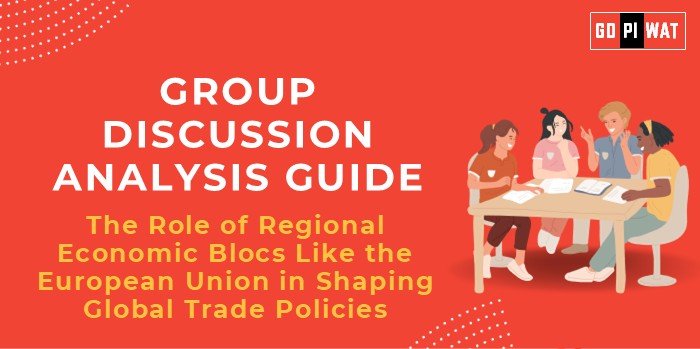📋 Group Discussion (GD) Analysis Guide
🌍 The Role of Regional Economic Blocs Like the European Union in Shaping Global Trade Policies
🌟 Introduction to the Topic
📖 Opening Context: Regional economic blocs like the European Union (EU) play a pivotal role in shaping global trade policies by fostering economic integration, driving international agreements, and influencing multilateral institutions. Their strategies can redefine global trade dynamics, impacting nations and businesses worldwide.
📜 Topic Background: Economic blocs emerged as mechanisms for fostering cooperation and shared economic benefits among member nations. The EU, with its structured single market and customs union, has set benchmarks in shaping trade regulations and negotiating trade deals collectively. With increasing globalization, such blocs wield significant power in global trade policy-making.
📊 Quick Facts and Key Statistics
- 📈 EU’s Trade Volume: Over €5 trillion in goods and services annually—showcasing its influence on global trade.
- 🤝 FTA Reach: The EU has over 70 trade agreements with nations worldwide, representing 40% of global GDP.
- 🌍 Single Market Scale: 27 member nations; 450 million consumers—illustrating the EU’s negotiation leverage.
- 🌏 Global Comparison: ASEAN accounts for 8% of global trade, while USMCA influences North American markets.
👥 Stakeholders and Their Roles
- 🏛️ European Union: Sets trade policy standards, negotiates deals, and ensures member compliance.
- 🇪🇺 Member Nations: Implement EU trade directives while influencing bloc-wide policies based on national interests.
- 🌐 Global Organizations: WTO and UNCTAD work alongside blocs to align international trade frameworks.
- 🏢 Private Corporations: Adapt to bloc regulations, benefiting from streamlined trade within the bloc.
🏆 Achievements and Challenges
🌟 Achievements:
- 📜 Trade Liberalization: The EU’s customs union eliminates internal tariffs, boosting intra-bloc trade by over 60%.
- 📏 Standard Setting: The EU’s policies (e.g., GDPR) often become global benchmarks.
- ♻️ Sustainability Leadership: EU’s Green Deal integrates environmental policies into trade agreements.
- 🤝 FTA Success: Deals like the EU-Japan Economic Partnership have enhanced global trade.
⚠️ Challenges:
- 🌍 Internal Disparities: Economic differences between wealthier and poorer member states can create policy friction.
- ❌ Global Resistance: Non-EU nations may view stringent EU standards as trade barriers.
- ⚔️ Geopolitical Pressures: Brexit and tensions with key partners like the U.S. disrupt cohesion.
🌍 Global Comparisons:
- ✅ Success: ASEAN focuses on regional supply chains but lacks the EU’s strong regulatory framework.
- ⚠️ Challenges: MERCOSUR struggles with political alignment, unlike the EU’s centralized governance.
📚 Case Study:
- 🇪🇺🤝🇻🇳 EU-Vietnam FTA: Showcases successful integration of environmental, labor, and trade priorities.
✨ Structured Arguments for Discussion
- 💬 Supporting Stance: “Regional economic blocs foster stability in global trade through collective negotiation and standardized practices.”
- ⚖️ Opposing Stance: “Blocs like the EU can undermine global trade equality by imposing stringent standards favoring developed nations.”
- 🔄 Balanced Perspective: “While regional blocs streamline internal trade and set global benchmarks, they must balance inclusion and fairness for external partners.”
🎯 Effective Discussion Approaches
📖 Opening Approaches:
- “The EU’s single market model represents one of the most successful regional trade frameworks globally…”
- “While economic blocs like the EU ensure stability, their rigid standards often create barriers for developing nations…”
🔄 Counter-Argument Handling:
- “While critics argue about inequality, the EU’s development aid programs address disparities.”
- “Global opposition exists, but bloc-driven sustainability measures are vital for long-term trade growth.”
📈 Strategic Analysis of Strengths and Weaknesses
- 💪 Strengths: Unified policies enhance negotiation power; supports smaller member states through collective agreements.
- ⚠️ Weaknesses: Geopolitical shifts like Brexit weaken cohesion; criticism of overly stringent trade policies.
- 💡 Opportunities: Expansion into emerging markets; leadership in sustainable trade frameworks.
- 🚨 Threats: Rising protectionism in global trade; internal political disagreements.
📚 Connecting with B-School Applications
- 🌟 Real-World Applications: Analysis of trade agreements for consulting or policy projects; studying the EU model for sustainability-focused business models.
- 💬 Sample Interview Questions:
- “What lessons can India learn from the EU in negotiating trade deals?”
- “Discuss the pros and cons of regional blocs in global trade policy.”
- 📖 Insights for Students:
- Understand the importance of sustainable trade models.
- Explore regulatory frameworks shaping business operations in different markets.


